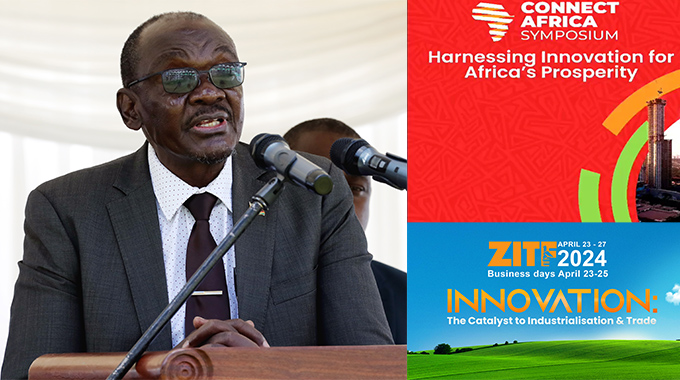Prioritizing Africa’s Growth and Food Security
Resident Representative of the United Nations Development Programme (UNDP), Dr Ayodele Odusola, highlighted the paradoxical situation where Africa, home to 60% of the world’s utilised arable land, struggles with poverty and food insecurity.
Presenting at Africa Symposium running under the theme ‘Harnessing Innovation for Africa’s Prosperity’ held at Zimbabwe International Trade Fair (ZITF) on 25 April, Dr Odusola pointed out that out of the approximately 733 million hectares of arable land in Africa, only 12% is effectively utilised.
This discrepancy raises questions about the continent’s ability to leverage its comparative advantage in agriculture to combat poverty and hunger.

African Paradox
“All these abundant resources, such as the longest river in the world, the second river with the largest volume of water, and the largest man-made lake with freshwater, are in Africa. Yet, less than 6% of our arable land is under irrigation. It’s a paradox,” Dr Odusola stated.
The UNDP official attributed Africa’s agricultural challenges to a range of factors, including the disproportionate share of labour in the sector, limited access to land for small farmers, and underinvestment in technological advancements and value chain development. He emphasised the need for transformative measures that address these issues holistically.
Dr Odusola outlined four critical areas for agricultural transformation: adoption of technology, access to inputs and markets for smallholders, productivity enhancement through precision agriculture, and climate-smart practices. He stressed the importance of involving farmers and farming communities in policy formulation and fostering strong alliances between the state, market, research institutions, and farming communities.
Digital Agriculture
“The future of agriculture lies in digitised farming and integration of smallholder farmers into agricultural policies. We must leverage the power of ecosystem approach and strengthen partnerships to shift the frontiers of development,” Dr Odusola asserted.
Furthermore, he called for increased market access for African agricultural products and urged developed nations to fulfil their commitment to halt counterproductive subsidies that hinder the competitiveness of African goods.
Highlighting the challenges and untapped potential of African agriculture, Country Director of CARE Zimbabwe, Patrick Sikana pointed out underutilisation, underinvestment, and wastefulness plaguing African agriculture, urging stakeholders to make agriculture “sexy” and prioritise it as a business.
African Potential
Sikana emphasised the vast potential of African agriculture, stating, “By 2050, 65% of the land required to feed 9 billion people on this planet will be on this continent. Yet, we are still importing food as a country.”
He highlighted the staggering wastage of agricultural produce, citing examples such as 30 to 40 percent of tomatoes from hard working women in Marondera going to waste before reaching the market and nearly 65% of mangoes from eastern Zambia meeting the same fate.
The Country Director drew attention to the missed opportunities that accompany such wastefulness, stating, “From just that mango fruit, it’s not just the fruit or the juice. It’s the seed, which can be used in pharmaceuticals to produce medicine that treats cardiovascular ailments. Yet, we throw away countless seeds as a continent.”
Agricultural Investment
Sikana underscored the urgent need for increased investment in agriculture, particularly in research, innovation, and development. He lamented the stark contrast between Africa’s current allocation of less than 1% of investments in agriculture and the four to 5% invested by countries in the West. “How on earth are we going to revitalize agriculture without adequate investments in research and development?” he questioned.
The Country Director called for a shift in perception, asserting that agriculture must be made “sexy” and seen as a viable business opportunity. He stressed the importance of incentivizing agriculture through reinvestment, quoting Albert Einstein’s famous words, “Compounding is the eighth wonder of the world.”
Rural Infrastructure
Sikana also highlighted the critical role of infrastructure in rural areas, including reliable power supply and improved access to ensure that processing facilities are located closer to production points. He advocated for the establishment of cold chains and strategic storage facilities to minimise losses.
In conclusion, both Sikana and Dr Odusola underscored the critical importance of prioritising agricultural transformation and allocating sufficient resources to the sector. They emphasised the need for consistent and supportive policies, increased investment in skills and education, and the integration of technology and climate-smart practices. By recognizing the potential of agriculture and taking decisive action, policymakers can drive inclusive growth, reduce poverty, and ensure food security for the benefit of African nations and their people.
#News in Bulawayo #News in Zimbabwe Artist Arts BCC Bulawayo Bulawayo City Council Bulawayo Drugs Bulawayo economy Bulawayo industry Bulawayo news Bulawayo Police Bulawayo Water Bulawayo Water Crisis Bulawayo Women entrepreneurship Business Women Community Culture Currency Drug Abuse Drugs Economy Farmer Farmers Farming Informal Sector Informal Traders MSMEs Music News in Bulawayo News in Zimbabwe Police Police in Bulawayo Vendor Vendors water Water Crisis Water Shortage water supply issue Women entrepreneurship ZESA Zimbabwean economy Zimbabwe news Zimbabwe water crisis ZITF ZRP
Join us for all News in Bulawayo and Bulawayo News in Zimbabwe.










